Understanding the Family's Impact on Early Childhood Education
VerifiedAdded on 2023/05/28
|8
|2184
|350
Essay
AI Summary
This essay discusses the vital role of the family in early childhood education and care, emphasizing its impact on a child's intellectual, emotional, social, and physical development. It highlights how positive early experiences and parental involvement contribute to a child's resiliency and overall well-being. The essay underscores the importance of parents as the first teachers, providing support, engagement, and access to activities that foster skill development. It also examines how different parenting styles and responsive parenting practices influence a child's cognitive and social-emotional growth, ultimately shaping their academic performance and future success. The study concludes that early childhood experiences, particularly within the family context, lay a crucial foundation for a child's long-term development and learning.
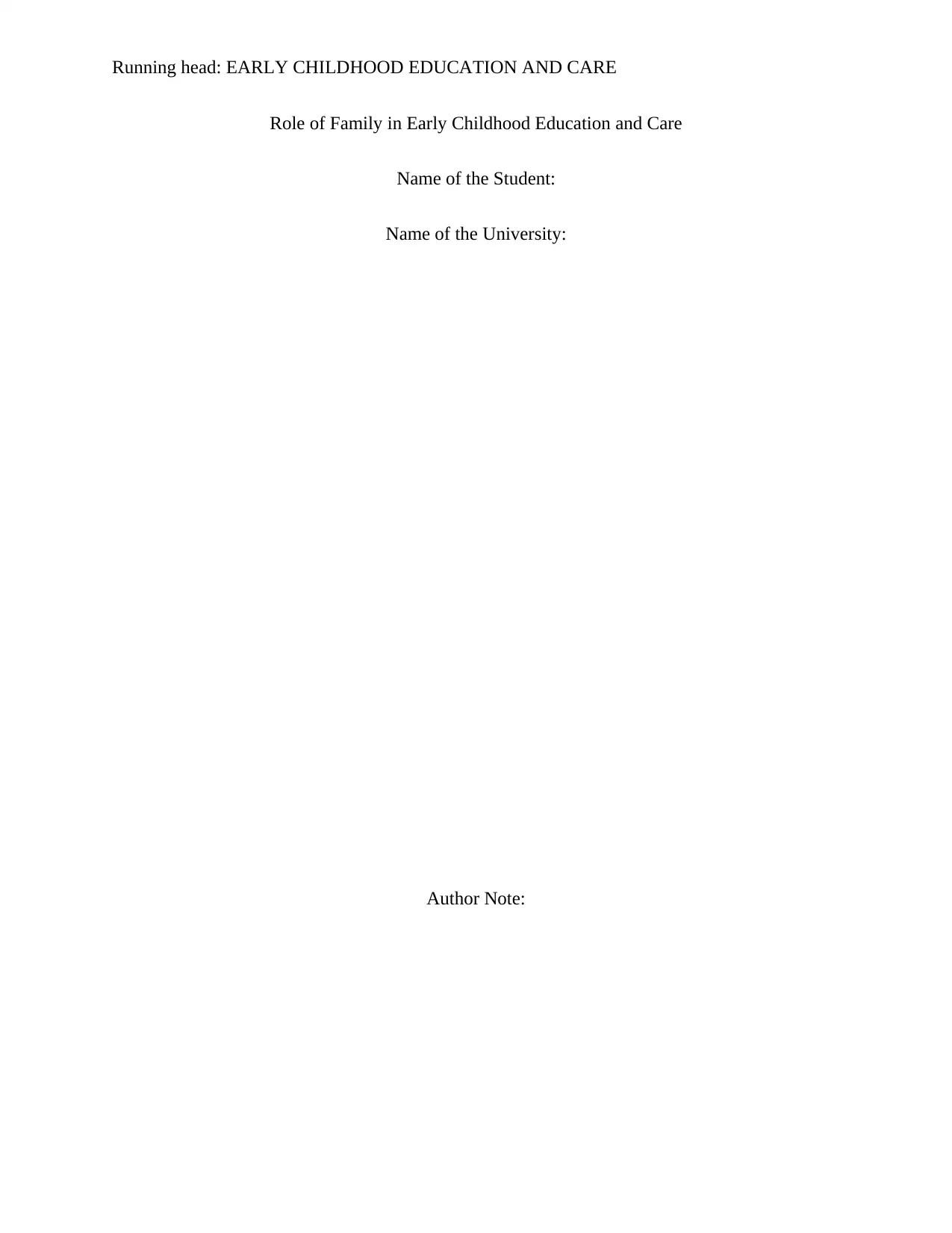
Running head: EARLY CHILDHOOD EDUCATION AND CARE
Role of Family in Early Childhood Education and Care
Name of the Student:
Name of the University:
Author Note:
Role of Family in Early Childhood Education and Care
Name of the Student:
Name of the University:
Author Note:
Paraphrase This Document
Need a fresh take? Get an instant paraphrase of this document with our AI Paraphraser
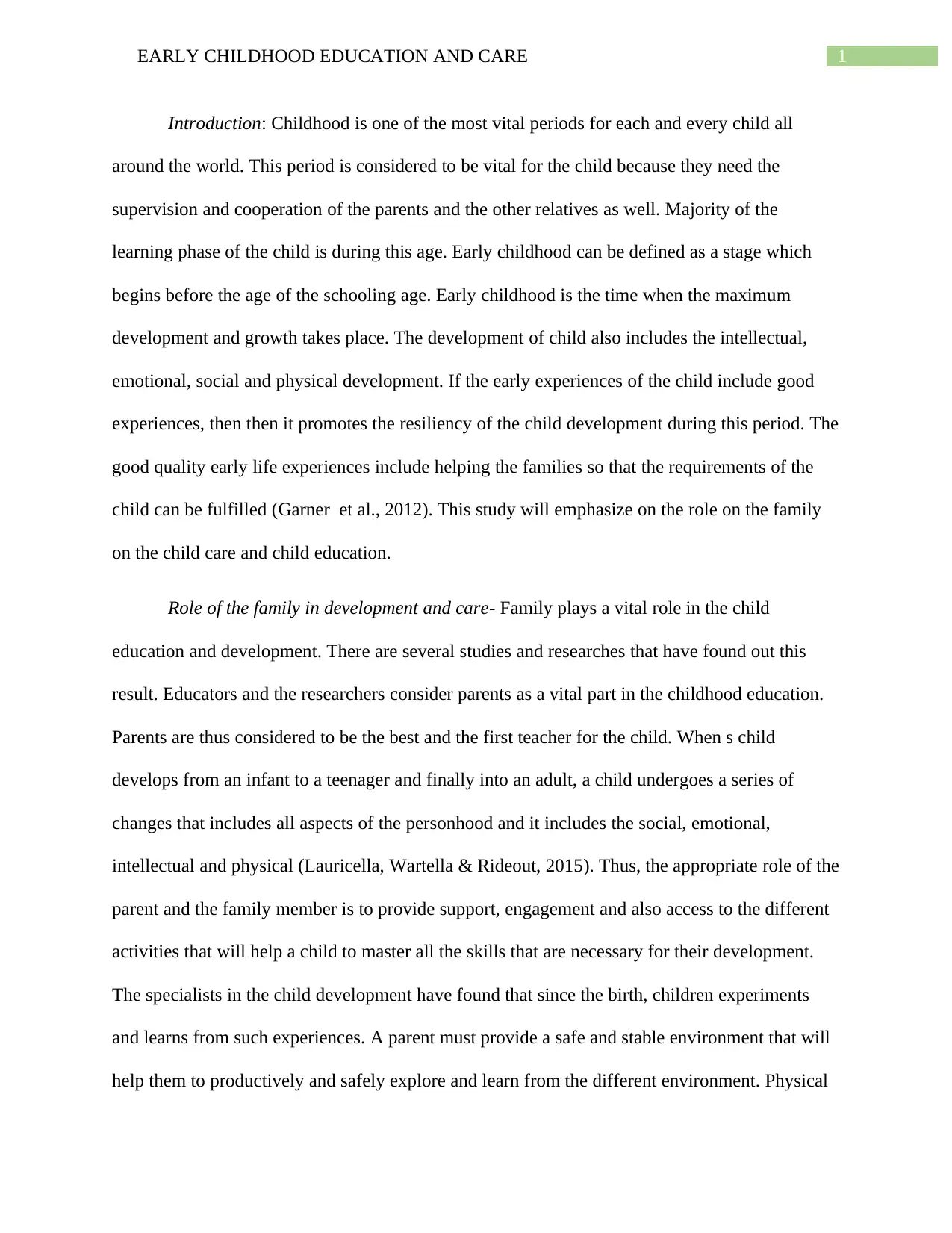
1EARLY CHILDHOOD EDUCATION AND CARE
Introduction: Childhood is one of the most vital periods for each and every child all
around the world. This period is considered to be vital for the child because they need the
supervision and cooperation of the parents and the other relatives as well. Majority of the
learning phase of the child is during this age. Early childhood can be defined as a stage which
begins before the age of the schooling age. Early childhood is the time when the maximum
development and growth takes place. The development of child also includes the intellectual,
emotional, social and physical development. If the early experiences of the child include good
experiences, then then it promotes the resiliency of the child development during this period. The
good quality early life experiences include helping the families so that the requirements of the
child can be fulfilled (Garner et al., 2012). This study will emphasize on the role on the family
on the child care and child education.
Role of the family in development and care- Family plays a vital role in the child
education and development. There are several studies and researches that have found out this
result. Educators and the researchers consider parents as a vital part in the childhood education.
Parents are thus considered to be the best and the first teacher for the child. When s child
develops from an infant to a teenager and finally into an adult, a child undergoes a series of
changes that includes all aspects of the personhood and it includes the social, emotional,
intellectual and physical (Lauricella, Wartella & Rideout, 2015). Thus, the appropriate role of the
parent and the family member is to provide support, engagement and also access to the different
activities that will help a child to master all the skills that are necessary for their development.
The specialists in the child development have found that since the birth, children experiments
and learns from such experiences. A parent must provide a safe and stable environment that will
help them to productively and safely explore and learn from the different environment. Physical
Introduction: Childhood is one of the most vital periods for each and every child all
around the world. This period is considered to be vital for the child because they need the
supervision and cooperation of the parents and the other relatives as well. Majority of the
learning phase of the child is during this age. Early childhood can be defined as a stage which
begins before the age of the schooling age. Early childhood is the time when the maximum
development and growth takes place. The development of child also includes the intellectual,
emotional, social and physical development. If the early experiences of the child include good
experiences, then then it promotes the resiliency of the child development during this period. The
good quality early life experiences include helping the families so that the requirements of the
child can be fulfilled (Garner et al., 2012). This study will emphasize on the role on the family
on the child care and child education.
Role of the family in development and care- Family plays a vital role in the child
education and development. There are several studies and researches that have found out this
result. Educators and the researchers consider parents as a vital part in the childhood education.
Parents are thus considered to be the best and the first teacher for the child. When s child
develops from an infant to a teenager and finally into an adult, a child undergoes a series of
changes that includes all aspects of the personhood and it includes the social, emotional,
intellectual and physical (Lauricella, Wartella & Rideout, 2015). Thus, the appropriate role of the
parent and the family member is to provide support, engagement and also access to the different
activities that will help a child to master all the skills that are necessary for their development.
The specialists in the child development have found that since the birth, children experiments
and learns from such experiences. A parent must provide a safe and stable environment that will
help them to productively and safely explore and learn from the different environment. Physical
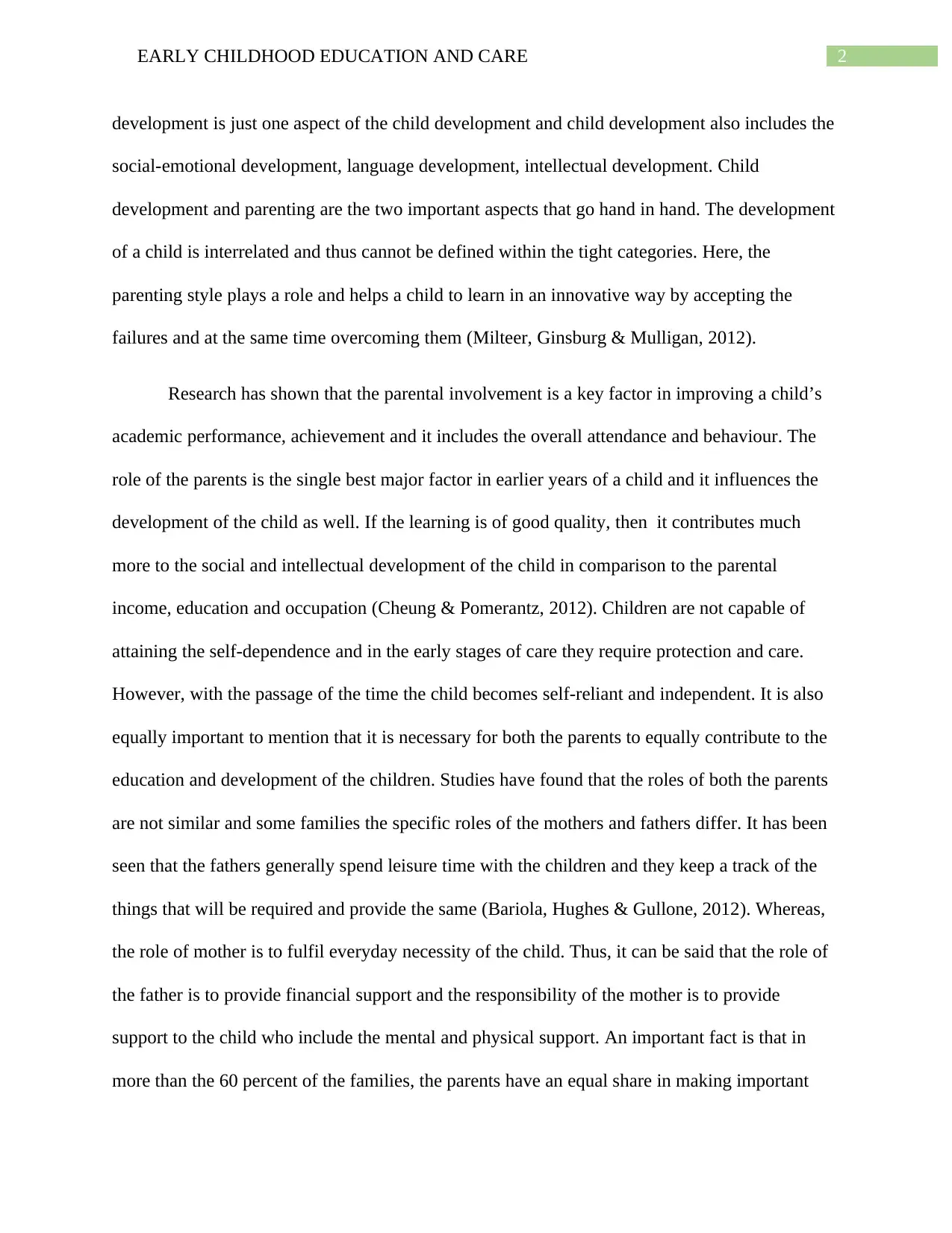
2EARLY CHILDHOOD EDUCATION AND CARE
development is just one aspect of the child development and child development also includes the
social-emotional development, language development, intellectual development. Child
development and parenting are the two important aspects that go hand in hand. The development
of a child is interrelated and thus cannot be defined within the tight categories. Here, the
parenting style plays a role and helps a child to learn in an innovative way by accepting the
failures and at the same time overcoming them (Milteer, Ginsburg & Mulligan, 2012).
Research has shown that the parental involvement is a key factor in improving a child’s
academic performance, achievement and it includes the overall attendance and behaviour. The
role of the parents is the single best major factor in earlier years of a child and it influences the
development of the child as well. If the learning is of good quality, then it contributes much
more to the social and intellectual development of the child in comparison to the parental
income, education and occupation (Cheung & Pomerantz, 2012). Children are not capable of
attaining the self-dependence and in the early stages of care they require protection and care.
However, with the passage of the time the child becomes self-reliant and independent. It is also
equally important to mention that it is necessary for both the parents to equally contribute to the
education and development of the children. Studies have found that the roles of both the parents
are not similar and some families the specific roles of the mothers and fathers differ. It has been
seen that the fathers generally spend leisure time with the children and they keep a track of the
things that will be required and provide the same (Bariola, Hughes & Gullone, 2012). Whereas,
the role of mother is to fulfil everyday necessity of the child. Thus, it can be said that the role of
the father is to provide financial support and the responsibility of the mother is to provide
support to the child who include the mental and physical support. An important fact is that in
more than the 60 percent of the families, the parents have an equal share in making important
development is just one aspect of the child development and child development also includes the
social-emotional development, language development, intellectual development. Child
development and parenting are the two important aspects that go hand in hand. The development
of a child is interrelated and thus cannot be defined within the tight categories. Here, the
parenting style plays a role and helps a child to learn in an innovative way by accepting the
failures and at the same time overcoming them (Milteer, Ginsburg & Mulligan, 2012).
Research has shown that the parental involvement is a key factor in improving a child’s
academic performance, achievement and it includes the overall attendance and behaviour. The
role of the parents is the single best major factor in earlier years of a child and it influences the
development of the child as well. If the learning is of good quality, then it contributes much
more to the social and intellectual development of the child in comparison to the parental
income, education and occupation (Cheung & Pomerantz, 2012). Children are not capable of
attaining the self-dependence and in the early stages of care they require protection and care.
However, with the passage of the time the child becomes self-reliant and independent. It is also
equally important to mention that it is necessary for both the parents to equally contribute to the
education and development of the children. Studies have found that the roles of both the parents
are not similar and some families the specific roles of the mothers and fathers differ. It has been
seen that the fathers generally spend leisure time with the children and they keep a track of the
things that will be required and provide the same (Bariola, Hughes & Gullone, 2012). Whereas,
the role of mother is to fulfil everyday necessity of the child. Thus, it can be said that the role of
the father is to provide financial support and the responsibility of the mother is to provide
support to the child who include the mental and physical support. An important fact is that in
more than the 60 percent of the families, the parents have an equal share in making important
⊘ This is a preview!⊘
Do you want full access?
Subscribe today to unlock all pages.

Trusted by 1+ million students worldwide
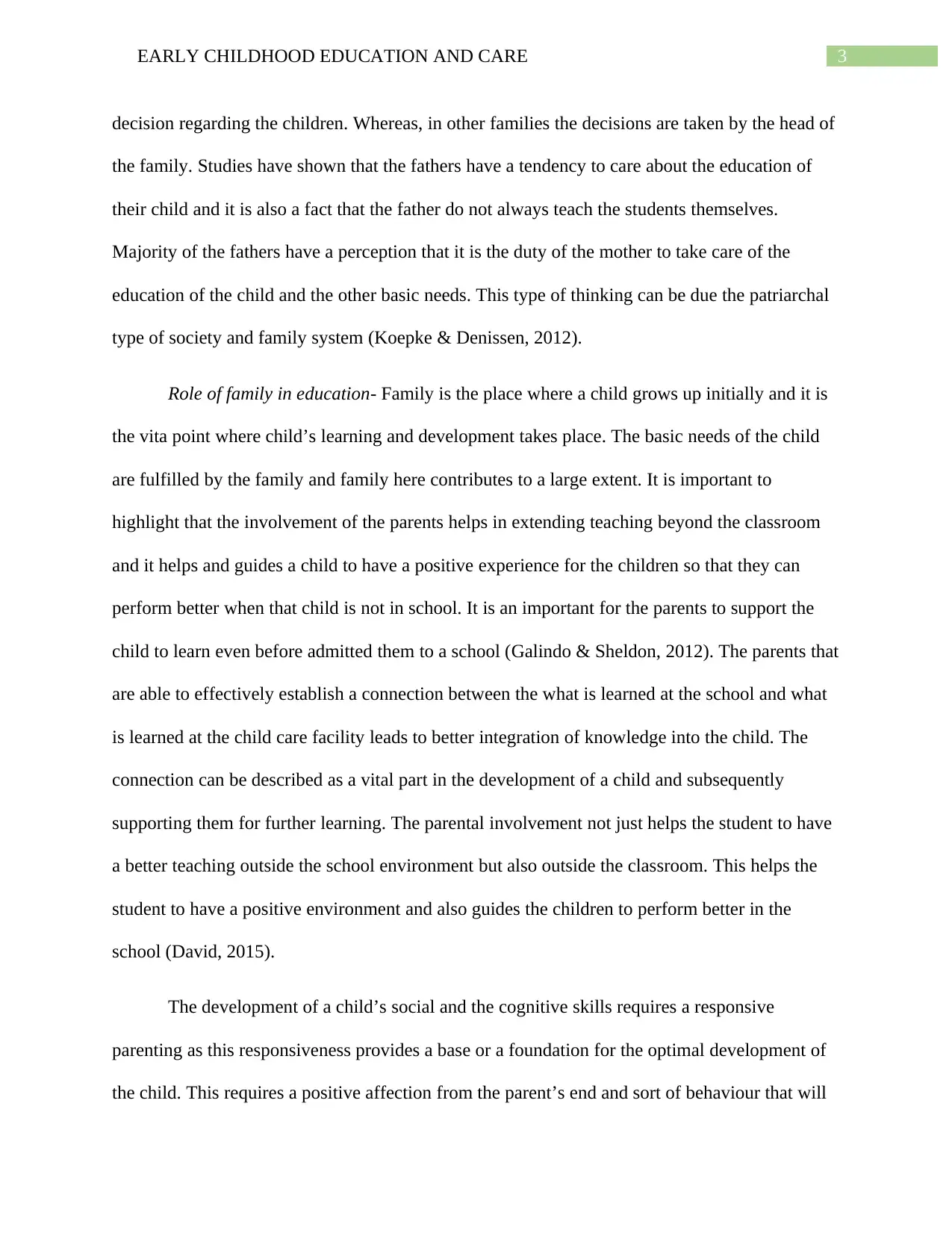
3EARLY CHILDHOOD EDUCATION AND CARE
decision regarding the children. Whereas, in other families the decisions are taken by the head of
the family. Studies have shown that the fathers have a tendency to care about the education of
their child and it is also a fact that the father do not always teach the students themselves.
Majority of the fathers have a perception that it is the duty of the mother to take care of the
education of the child and the other basic needs. This type of thinking can be due the patriarchal
type of society and family system (Koepke & Denissen, 2012).
Role of family in education- Family is the place where a child grows up initially and it is
the vita point where child’s learning and development takes place. The basic needs of the child
are fulfilled by the family and family here contributes to a large extent. It is important to
highlight that the involvement of the parents helps in extending teaching beyond the classroom
and it helps and guides a child to have a positive experience for the children so that they can
perform better when that child is not in school. It is an important for the parents to support the
child to learn even before admitted them to a school (Galindo & Sheldon, 2012). The parents that
are able to effectively establish a connection between the what is learned at the school and what
is learned at the child care facility leads to better integration of knowledge into the child. The
connection can be described as a vital part in the development of a child and subsequently
supporting them for further learning. The parental involvement not just helps the student to have
a better teaching outside the school environment but also outside the classroom. This helps the
student to have a positive environment and also guides the children to perform better in the
school (David, 2015).
The development of a child’s social and the cognitive skills requires a responsive
parenting as this responsiveness provides a base or a foundation for the optimal development of
the child. This requires a positive affection from the parent’s end and sort of behaviour that will
decision regarding the children. Whereas, in other families the decisions are taken by the head of
the family. Studies have shown that the fathers have a tendency to care about the education of
their child and it is also a fact that the father do not always teach the students themselves.
Majority of the fathers have a perception that it is the duty of the mother to take care of the
education of the child and the other basic needs. This type of thinking can be due the patriarchal
type of society and family system (Koepke & Denissen, 2012).
Role of family in education- Family is the place where a child grows up initially and it is
the vita point where child’s learning and development takes place. The basic needs of the child
are fulfilled by the family and family here contributes to a large extent. It is important to
highlight that the involvement of the parents helps in extending teaching beyond the classroom
and it helps and guides a child to have a positive experience for the children so that they can
perform better when that child is not in school. It is an important for the parents to support the
child to learn even before admitted them to a school (Galindo & Sheldon, 2012). The parents that
are able to effectively establish a connection between the what is learned at the school and what
is learned at the child care facility leads to better integration of knowledge into the child. The
connection can be described as a vital part in the development of a child and subsequently
supporting them for further learning. The parental involvement not just helps the student to have
a better teaching outside the school environment but also outside the classroom. This helps the
student to have a positive environment and also guides the children to perform better in the
school (David, 2015).
The development of a child’s social and the cognitive skills requires a responsive
parenting as this responsiveness provides a base or a foundation for the optimal development of
the child. This requires a positive affection from the parent’s end and sort of behaviour that will
Paraphrase This Document
Need a fresh take? Get an instant paraphrase of this document with our AI Paraphraser
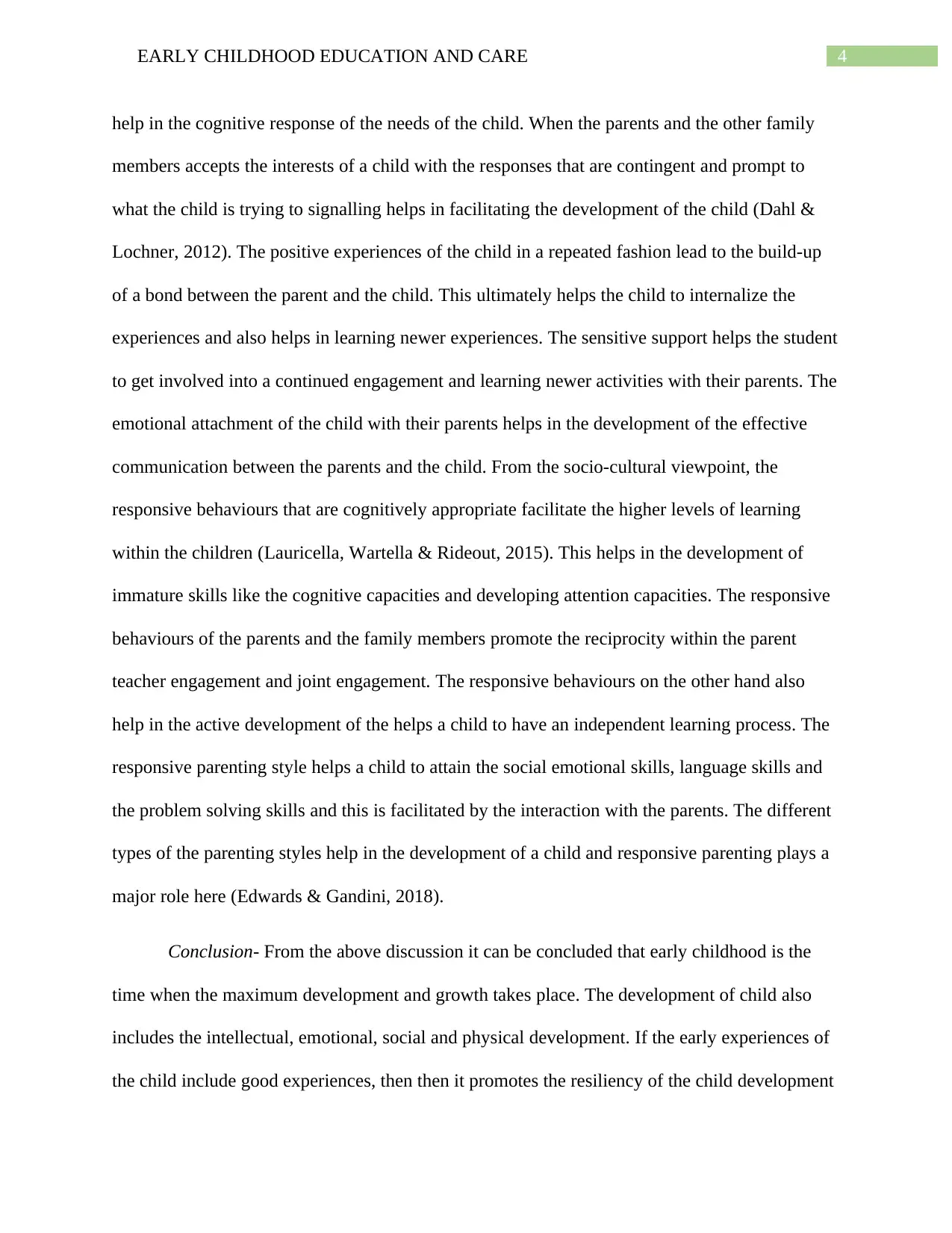
4EARLY CHILDHOOD EDUCATION AND CARE
help in the cognitive response of the needs of the child. When the parents and the other family
members accepts the interests of a child with the responses that are contingent and prompt to
what the child is trying to signalling helps in facilitating the development of the child (Dahl &
Lochner, 2012). The positive experiences of the child in a repeated fashion lead to the build-up
of a bond between the parent and the child. This ultimately helps the child to internalize the
experiences and also helps in learning newer experiences. The sensitive support helps the student
to get involved into a continued engagement and learning newer activities with their parents. The
emotional attachment of the child with their parents helps in the development of the effective
communication between the parents and the child. From the socio-cultural viewpoint, the
responsive behaviours that are cognitively appropriate facilitate the higher levels of learning
within the children (Lauricella, Wartella & Rideout, 2015). This helps in the development of
immature skills like the cognitive capacities and developing attention capacities. The responsive
behaviours of the parents and the family members promote the reciprocity within the parent
teacher engagement and joint engagement. The responsive behaviours on the other hand also
help in the active development of the helps a child to have an independent learning process. The
responsive parenting style helps a child to attain the social emotional skills, language skills and
the problem solving skills and this is facilitated by the interaction with the parents. The different
types of the parenting styles help in the development of a child and responsive parenting plays a
major role here (Edwards & Gandini, 2018).
Conclusion- From the above discussion it can be concluded that early childhood is the
time when the maximum development and growth takes place. The development of child also
includes the intellectual, emotional, social and physical development. If the early experiences of
the child include good experiences, then then it promotes the resiliency of the child development
help in the cognitive response of the needs of the child. When the parents and the other family
members accepts the interests of a child with the responses that are contingent and prompt to
what the child is trying to signalling helps in facilitating the development of the child (Dahl &
Lochner, 2012). The positive experiences of the child in a repeated fashion lead to the build-up
of a bond between the parent and the child. This ultimately helps the child to internalize the
experiences and also helps in learning newer experiences. The sensitive support helps the student
to get involved into a continued engagement and learning newer activities with their parents. The
emotional attachment of the child with their parents helps in the development of the effective
communication between the parents and the child. From the socio-cultural viewpoint, the
responsive behaviours that are cognitively appropriate facilitate the higher levels of learning
within the children (Lauricella, Wartella & Rideout, 2015). This helps in the development of
immature skills like the cognitive capacities and developing attention capacities. The responsive
behaviours of the parents and the family members promote the reciprocity within the parent
teacher engagement and joint engagement. The responsive behaviours on the other hand also
help in the active development of the helps a child to have an independent learning process. The
responsive parenting style helps a child to attain the social emotional skills, language skills and
the problem solving skills and this is facilitated by the interaction with the parents. The different
types of the parenting styles help in the development of a child and responsive parenting plays a
major role here (Edwards & Gandini, 2018).
Conclusion- From the above discussion it can be concluded that early childhood is the
time when the maximum development and growth takes place. The development of child also
includes the intellectual, emotional, social and physical development. If the early experiences of
the child include good experiences, then then it promotes the resiliency of the child development
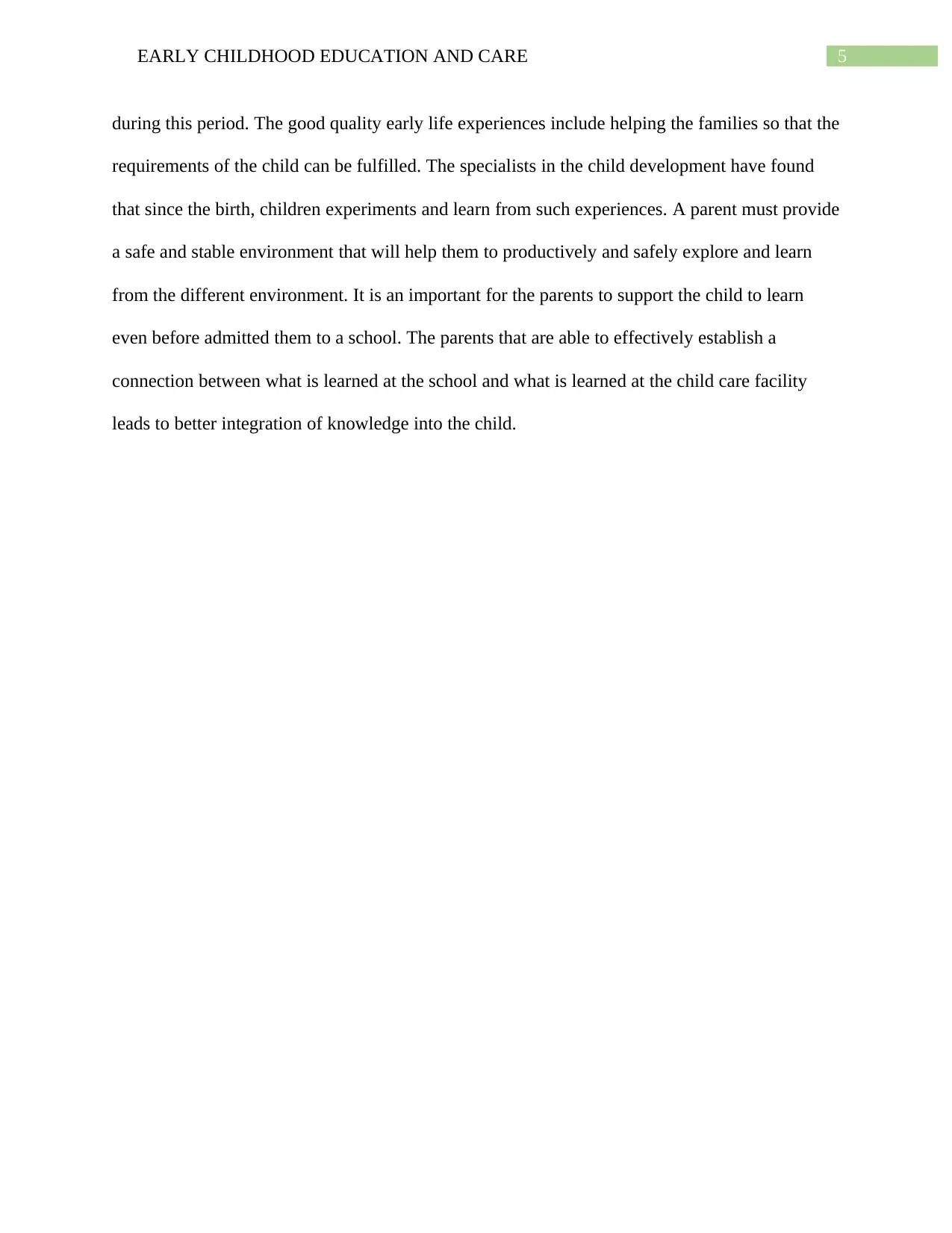
5EARLY CHILDHOOD EDUCATION AND CARE
during this period. The good quality early life experiences include helping the families so that the
requirements of the child can be fulfilled. The specialists in the child development have found
that since the birth, children experiments and learn from such experiences. A parent must provide
a safe and stable environment that will help them to productively and safely explore and learn
from the different environment. It is an important for the parents to support the child to learn
even before admitted them to a school. The parents that are able to effectively establish a
connection between what is learned at the school and what is learned at the child care facility
leads to better integration of knowledge into the child.
during this period. The good quality early life experiences include helping the families so that the
requirements of the child can be fulfilled. The specialists in the child development have found
that since the birth, children experiments and learn from such experiences. A parent must provide
a safe and stable environment that will help them to productively and safely explore and learn
from the different environment. It is an important for the parents to support the child to learn
even before admitted them to a school. The parents that are able to effectively establish a
connection between what is learned at the school and what is learned at the child care facility
leads to better integration of knowledge into the child.
⊘ This is a preview!⊘
Do you want full access?
Subscribe today to unlock all pages.

Trusted by 1+ million students worldwide
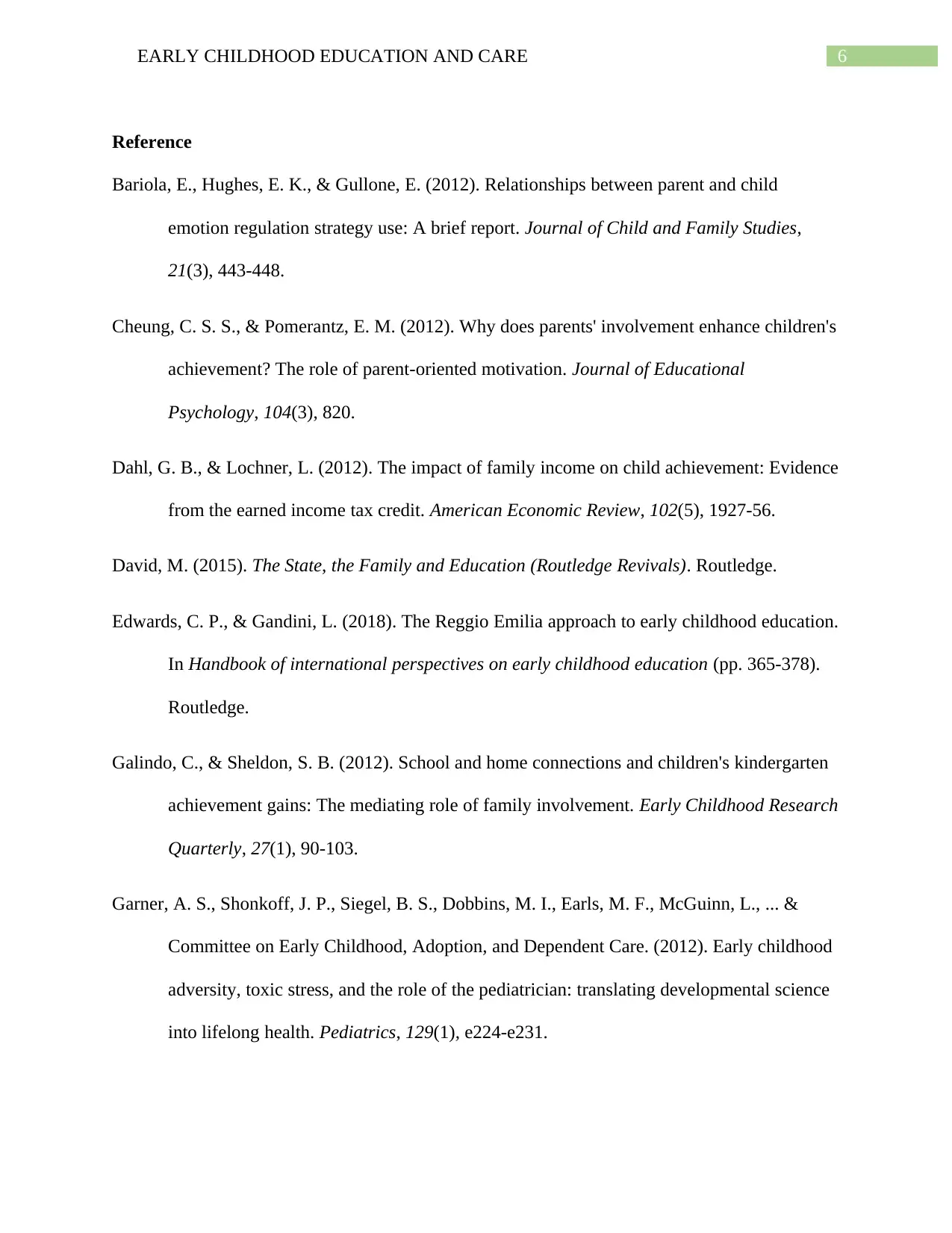
6EARLY CHILDHOOD EDUCATION AND CARE
Reference
Bariola, E., Hughes, E. K., & Gullone, E. (2012). Relationships between parent and child
emotion regulation strategy use: A brief report. Journal of Child and Family Studies,
21(3), 443-448.
Cheung, C. S. S., & Pomerantz, E. M. (2012). Why does parents' involvement enhance children's
achievement? The role of parent-oriented motivation. Journal of Educational
Psychology, 104(3), 820.
Dahl, G. B., & Lochner, L. (2012). The impact of family income on child achievement: Evidence
from the earned income tax credit. American Economic Review, 102(5), 1927-56.
David, M. (2015). The State, the Family and Education (Routledge Revivals). Routledge.
Edwards, C. P., & Gandini, L. (2018). The Reggio Emilia approach to early childhood education.
In Handbook of international perspectives on early childhood education (pp. 365-378).
Routledge.
Galindo, C., & Sheldon, S. B. (2012). School and home connections and children's kindergarten
achievement gains: The mediating role of family involvement. Early Childhood Research
Quarterly, 27(1), 90-103.
Garner, A. S., Shonkoff, J. P., Siegel, B. S., Dobbins, M. I., Earls, M. F., McGuinn, L., ... &
Committee on Early Childhood, Adoption, and Dependent Care. (2012). Early childhood
adversity, toxic stress, and the role of the pediatrician: translating developmental science
into lifelong health. Pediatrics, 129(1), e224-e231.
Reference
Bariola, E., Hughes, E. K., & Gullone, E. (2012). Relationships between parent and child
emotion regulation strategy use: A brief report. Journal of Child and Family Studies,
21(3), 443-448.
Cheung, C. S. S., & Pomerantz, E. M. (2012). Why does parents' involvement enhance children's
achievement? The role of parent-oriented motivation. Journal of Educational
Psychology, 104(3), 820.
Dahl, G. B., & Lochner, L. (2012). The impact of family income on child achievement: Evidence
from the earned income tax credit. American Economic Review, 102(5), 1927-56.
David, M. (2015). The State, the Family and Education (Routledge Revivals). Routledge.
Edwards, C. P., & Gandini, L. (2018). The Reggio Emilia approach to early childhood education.
In Handbook of international perspectives on early childhood education (pp. 365-378).
Routledge.
Galindo, C., & Sheldon, S. B. (2012). School and home connections and children's kindergarten
achievement gains: The mediating role of family involvement. Early Childhood Research
Quarterly, 27(1), 90-103.
Garner, A. S., Shonkoff, J. P., Siegel, B. S., Dobbins, M. I., Earls, M. F., McGuinn, L., ... &
Committee on Early Childhood, Adoption, and Dependent Care. (2012). Early childhood
adversity, toxic stress, and the role of the pediatrician: translating developmental science
into lifelong health. Pediatrics, 129(1), e224-e231.
Paraphrase This Document
Need a fresh take? Get an instant paraphrase of this document with our AI Paraphraser
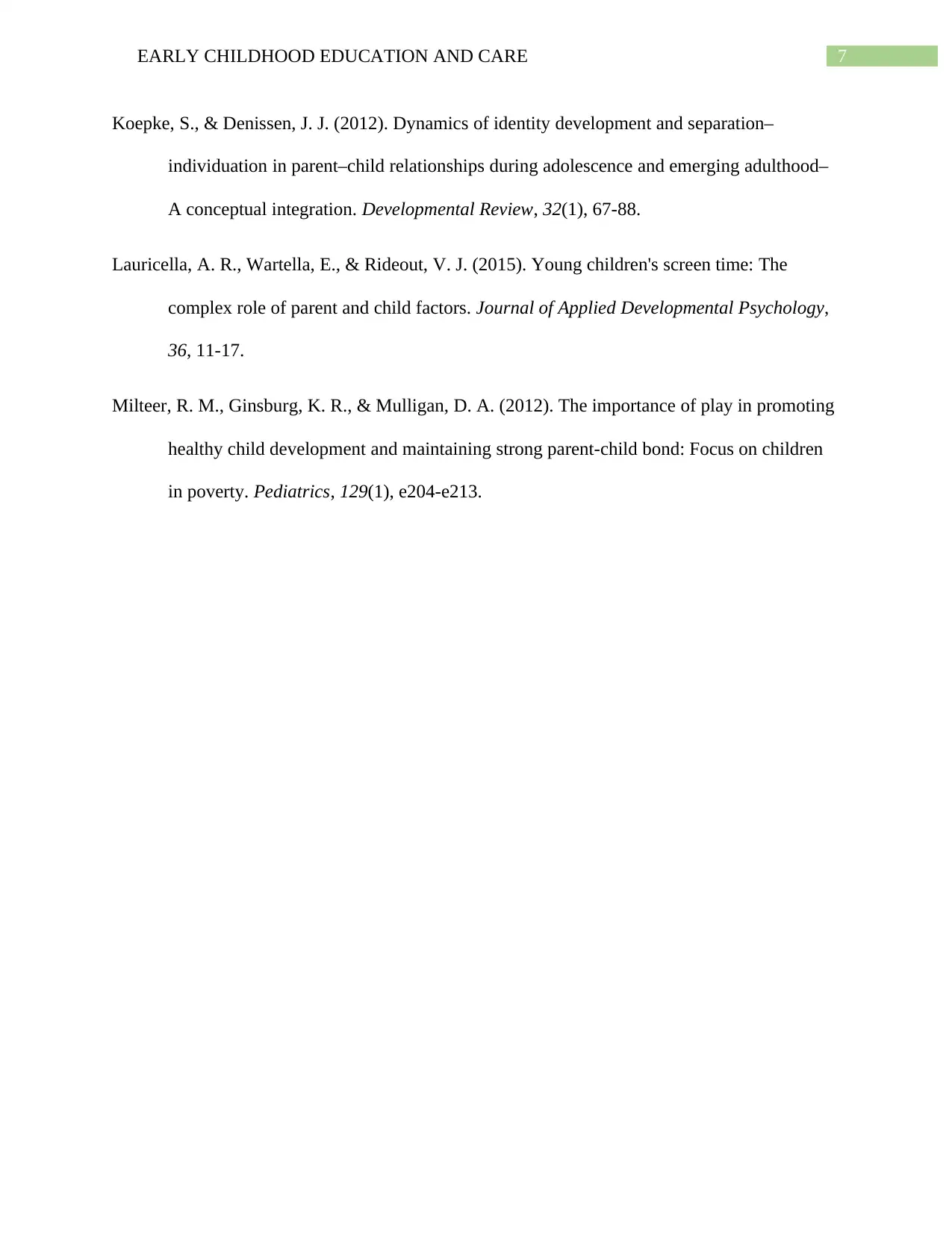
7EARLY CHILDHOOD EDUCATION AND CARE
Koepke, S., & Denissen, J. J. (2012). Dynamics of identity development and separation–
individuation in parent–child relationships during adolescence and emerging adulthood–
A conceptual integration. Developmental Review, 32(1), 67-88.
Lauricella, A. R., Wartella, E., & Rideout, V. J. (2015). Young children's screen time: The
complex role of parent and child factors. Journal of Applied Developmental Psychology,
36, 11-17.
Milteer, R. M., Ginsburg, K. R., & Mulligan, D. A. (2012). The importance of play in promoting
healthy child development and maintaining strong parent-child bond: Focus on children
in poverty. Pediatrics, 129(1), e204-e213.
Koepke, S., & Denissen, J. J. (2012). Dynamics of identity development and separation–
individuation in parent–child relationships during adolescence and emerging adulthood–
A conceptual integration. Developmental Review, 32(1), 67-88.
Lauricella, A. R., Wartella, E., & Rideout, V. J. (2015). Young children's screen time: The
complex role of parent and child factors. Journal of Applied Developmental Psychology,
36, 11-17.
Milteer, R. M., Ginsburg, K. R., & Mulligan, D. A. (2012). The importance of play in promoting
healthy child development and maintaining strong parent-child bond: Focus on children
in poverty. Pediatrics, 129(1), e204-e213.
1 out of 8
Related Documents
Your All-in-One AI-Powered Toolkit for Academic Success.
+13062052269
info@desklib.com
Available 24*7 on WhatsApp / Email
![[object Object]](/_next/static/media/star-bottom.7253800d.svg)
Unlock your academic potential
Copyright © 2020–2026 A2Z Services. All Rights Reserved. Developed and managed by ZUCOL.




